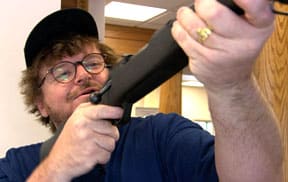Prescience is what separates the great from the merely good and agitator Michael Moore has built his career on capturing that emerging zeitgeist. In Bowling, it is America's culture of fear and how that fuels their violent tendencies. When begun in '99, two teens taking out 12 classmates was the ultimate expression of this but by its finish three years later, 9/11 had morphed his simple argument into a rallying cry. On second viewing, what struck me was not the silly "Africanised bees" tangent, the unlikely unlocked Toronto homes, the hilarious "free gun with new bank account" promotion or even the still-powerful security camera footage from Columbine High. This time the scariest moment was Dubya's "blanket alert due to a general threat" and the knowledge that people have been, and continue to be, so easily duped. The film came out long before Gulf War II got underway in fact, the war started just days before Moore's Oscar speech decried Bush's fictitious presidency. But it is about that war and these fictitious times when Republican thugs keep the people at bay with orange alerts and duct tape fallacies while blowing up innocent Iraqis. Though Moore couldn't include his 45-second speech on the DVD due to the academy's petty refusal, he does take 15 minutes to recount the moment (saying the mixed boos and cheers was "the sound of democracy"). The short documentary of his return to Denver for a speech is powerful, though Moore does come off a little hysterical at times but he connects with people, as emotionally evidenced by a Columbine survivor who approaches him afterwards. Interviews by Charlie Rose and Former Clinton press secretary Joe Lockhart are quite informative and provide an opportunity to lay out his political agenda. Moore also includes teaching aids, film festival snippets and a Marilyn Manson video. But as the interns and receptionists reveal on the commentary track (yes really, Moore delegated this task to his "lowest rung" workers) there was a six-hour cut at one point. So where are the outtakes? Perhaps Moore didn't want to take away from the tight flow of the final version, but at one point he reveals that Heston refused to open the gate for him leave, forcing the director to toss the film to his awaiting employees who fled with it. Now I want more. Extras: commentary; interviews; film festival scrapbook; more. (Alliance Atlantis)
Bowling for Columbine
Michael Moore

BY Joshua OstroffPublished Sep 1, 2003